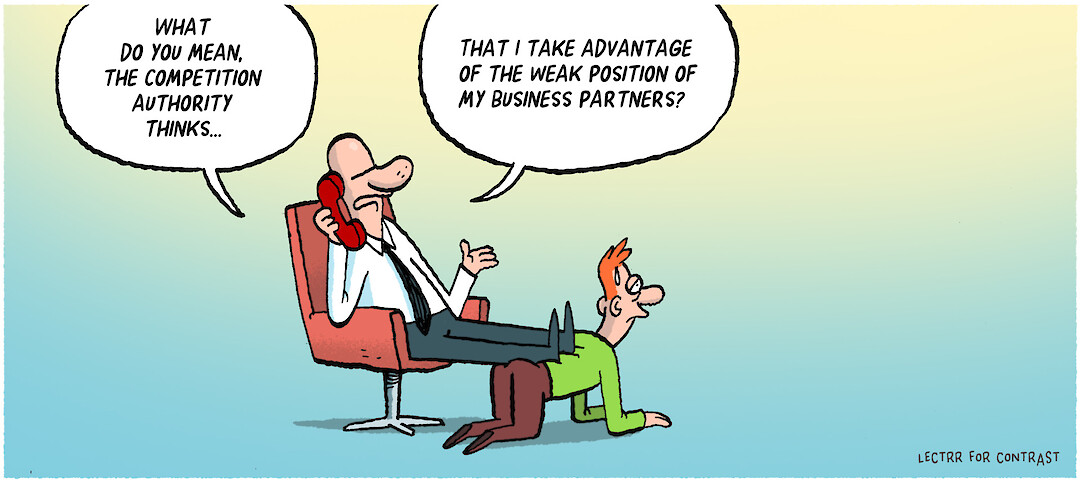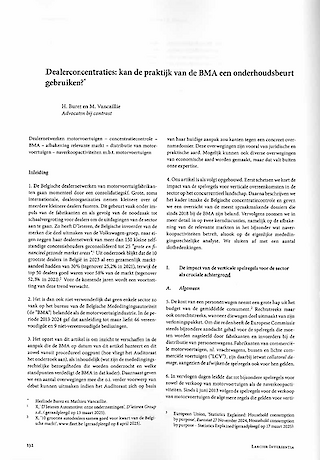In the Picture

Abuse of economic dependence: David’s new weapon against Goliath
June 2020Imagine…
Your company is specialised in the production of electric bicycles. Your latest product, a new model of folding electric bike, has been a huge success and considerably heightened the notoriety of your brand. Given the strong customer demand for this new model, the number of orders being placed by your distributors (specialty stores selling cycling equipment) has gone through the roof. Your new folding electric bicycle has become a must-have . . .
To further boost your sales and reduce your logistics costs, you decide to revise your distribution system. Your goal is to limit the number of points of sale to the fifty specialised stores that you deem to be the most effective at promoting your products, on the basis of their sales force and recent results. This new orientation means that you will stop supplying the other stores.
One of the stores that was dropped, a long-time distributor of your bicycles, believes that it was harmed by this move; it accuses you of having committed an abuse, and darkly suggests that you could be severely sanctioned for this practice. That last bit puzzles you: even if your sales have increased considerably, largely thanks to your new folding electric model, you are a long way from holding a dominant position on the market.
High time to consult your lawyer…
A brief clarification…
Article IV.2/1 of the Code of Economic Law will be entering into effect on 1 December 2020 at the latest. This provision prohibits the « abuse of economic dependence ». Yes, you read that correctly, it is not a question of "abuse of a dominant position", but rather "abuse of economic dependence", a new form of so-called « relative » abuse between trading partners.
Following the lead of other EU Member States (notably France and Germany), the Belgian legislature adopted a prohibition that applies to companies in a position of relative power vis-à-vis another company. The latter therefore finds itself in a « position of economic dependence » relative to the former because there is, for instance, no equivalent alternative available within a reasonable period, under reasonable conditions and at reasonable cost.
Any company in a position of economic dependence may rely on the protection of Article IV.2/1 of the Code of Economic Law. This provision applies in other words to both suppliers and buyers, whatever their size.
The fact that a company is in a position of economic dependence vis-à-vis a trading partner is not per se objectionable. As is the case for dominant companies, it is only the abuse of the trading partner’s position of economic dependence that is unlawful. In addition, the abuse must be capable of affecting competition on the relevant Belgian market (or a substantial part thereof).
The list of practices that qualify as abusive in a situation of economic dependence includes all of those that the law foresees in the event of dominant position, to which are added the refusal of a sale, a purchase or other transaction terms. Thus, for instance, the arbitrary imposition of an excessive increase of the price constitutes a prohibited abusive practice, as does the ceasing of supplies of a product that is indispensable for a distributor, as well as restricting production to the detriment of consumers.
The distributor whose interests were harmed by the decision of your company to abruptly stop supplying electric bicycles could therefore envisage filing a complaint with the Belgian Competition Authority to denounce an abuse of economic dependence.
The Belgian Competition Authority will be specifically competent to detect, pursue and sanction infringements of the new prohibition. It possesses broad investigative powers and may impose fines amounting to as much as 2% of the concerned company´s turnover. The Authority may also impose a periodic penalty payment of up to 2% of the average daily turnover per day of delay in bringing the infringement to an end.
In addition, the Belgian courts and tribunals remain competent to order the abuse to be ceased, and are the only competent bodies for granting damages to the company victim of an abuse of economic dependence.
Concretely:
- Every supplier or purchaser holding a position of power vis-à-vis a trading partner must be vigilant in the light of the new prohibition. Within the framework of distribution contracts, some distributors might be regarded as being in a situation of economic dependence vis-à-vis their supplier. That is particularly the case in franchising, subcontracting and exclusive dealership relations.
- There is economic dependence in the case of « relative domination » of one company vis-à-vis another. This requirement is distinct from that of an effective dominant position on the relevant market, which only arises if the company holds a market share greater than 40%. The prohibition applies irrespective of the size and market share of the trading partners, as long as the abuse is capable of affecting competition on the Belgian market (or a substantial part thereof).
- Therefore, three cumulative conditions must be fulfilled:
- there must be a position of economic dependence (which is not prohibited per se);
- there must be an abuse thereof; and
- the abuse must be capable of affecting competition on the Belgian market (or a substantial part thereof).
- The Belgian Competition Authority monitors compliance with the prohibition and will be able to impose significant fines and periodic penalty payments in the event of violation of the prohibition.
Want to know more?
You can consult the Act of 4 April 2019 via this link: https://www.abc-bma.be/sites/default/files/content/download/files/20190404_loi_wet.pdf; and its preparatory works via this link: https://www.lachambre.be/FLWB/PDF/54/1451/54K1451003.pdf.











